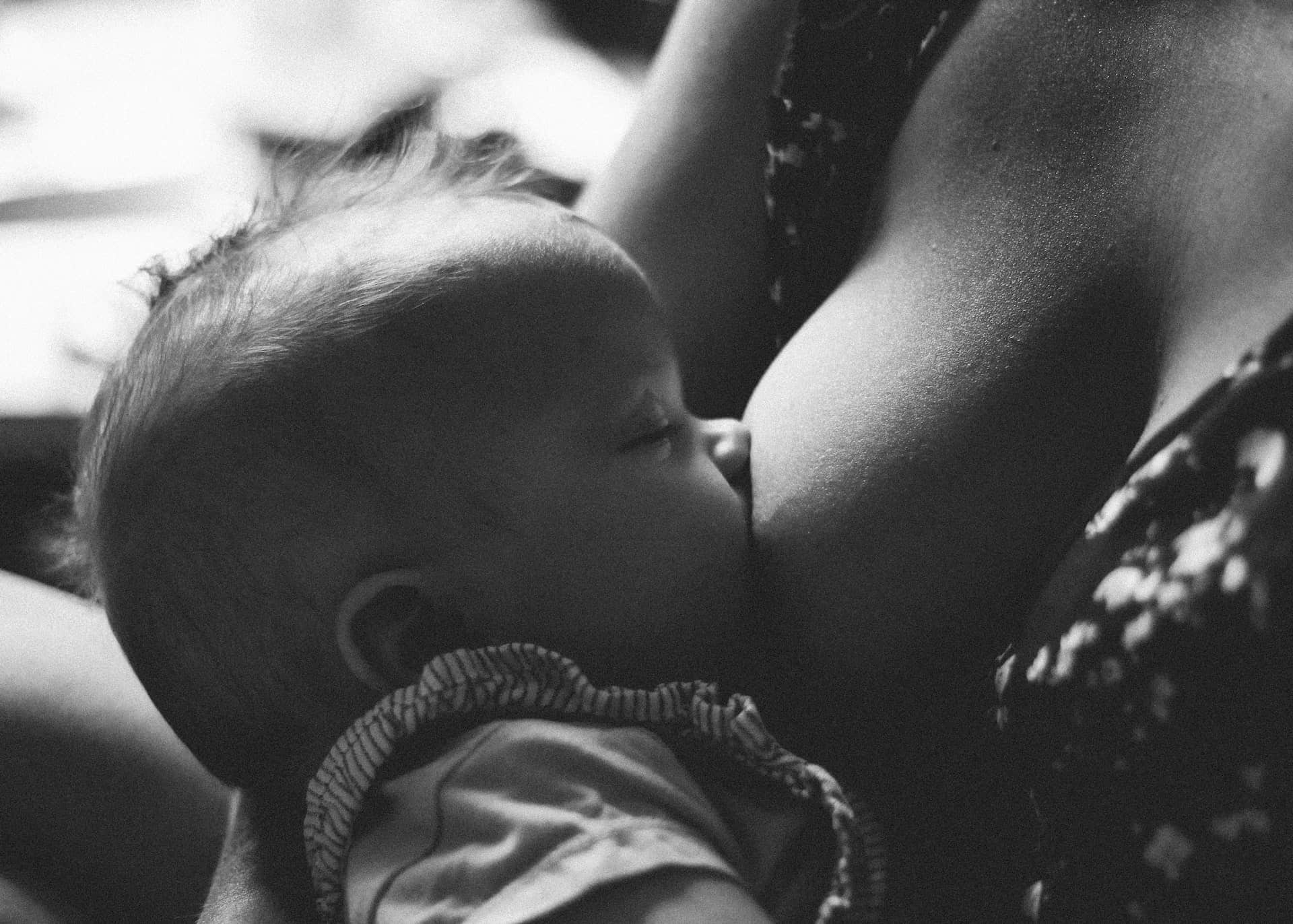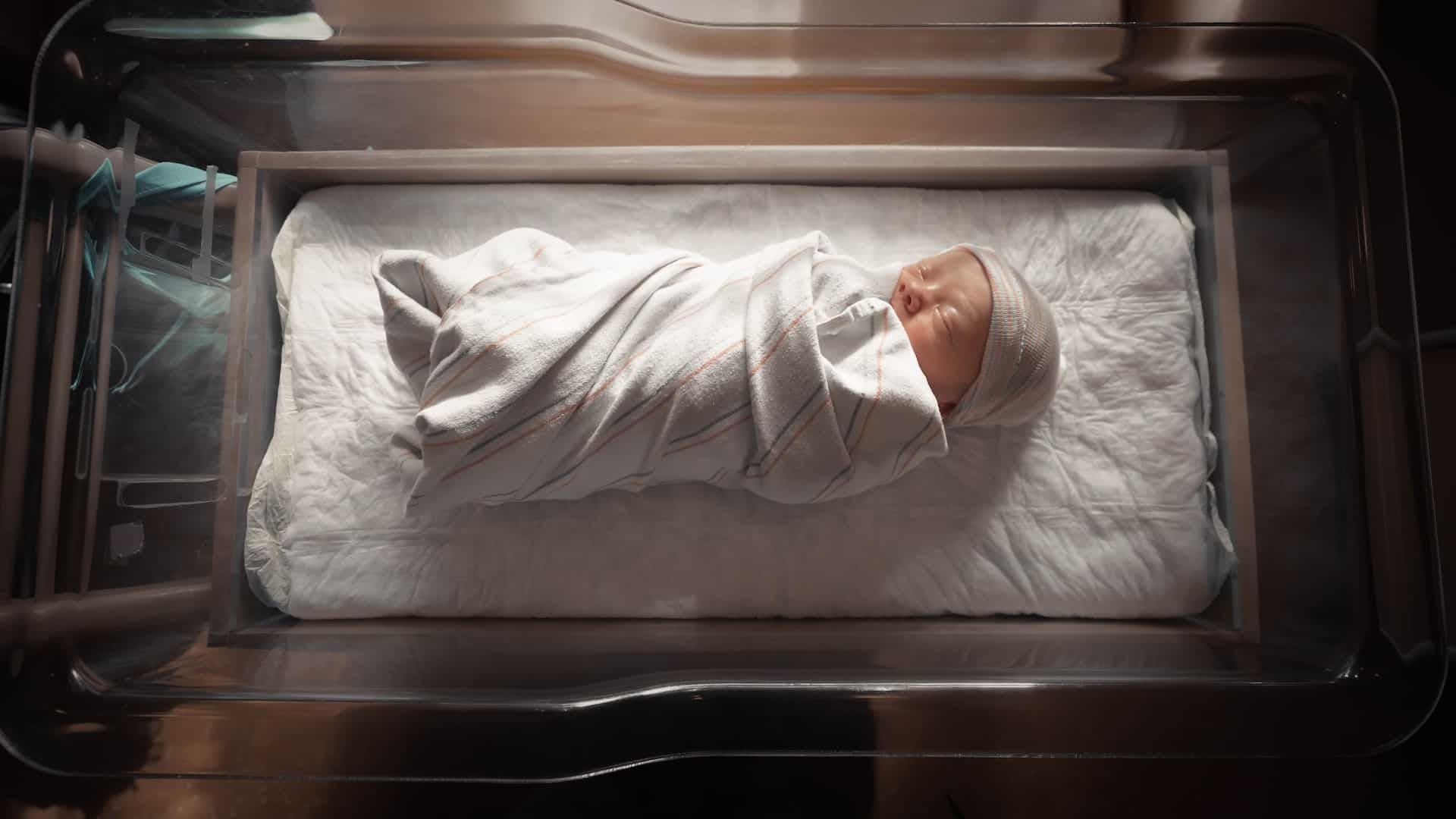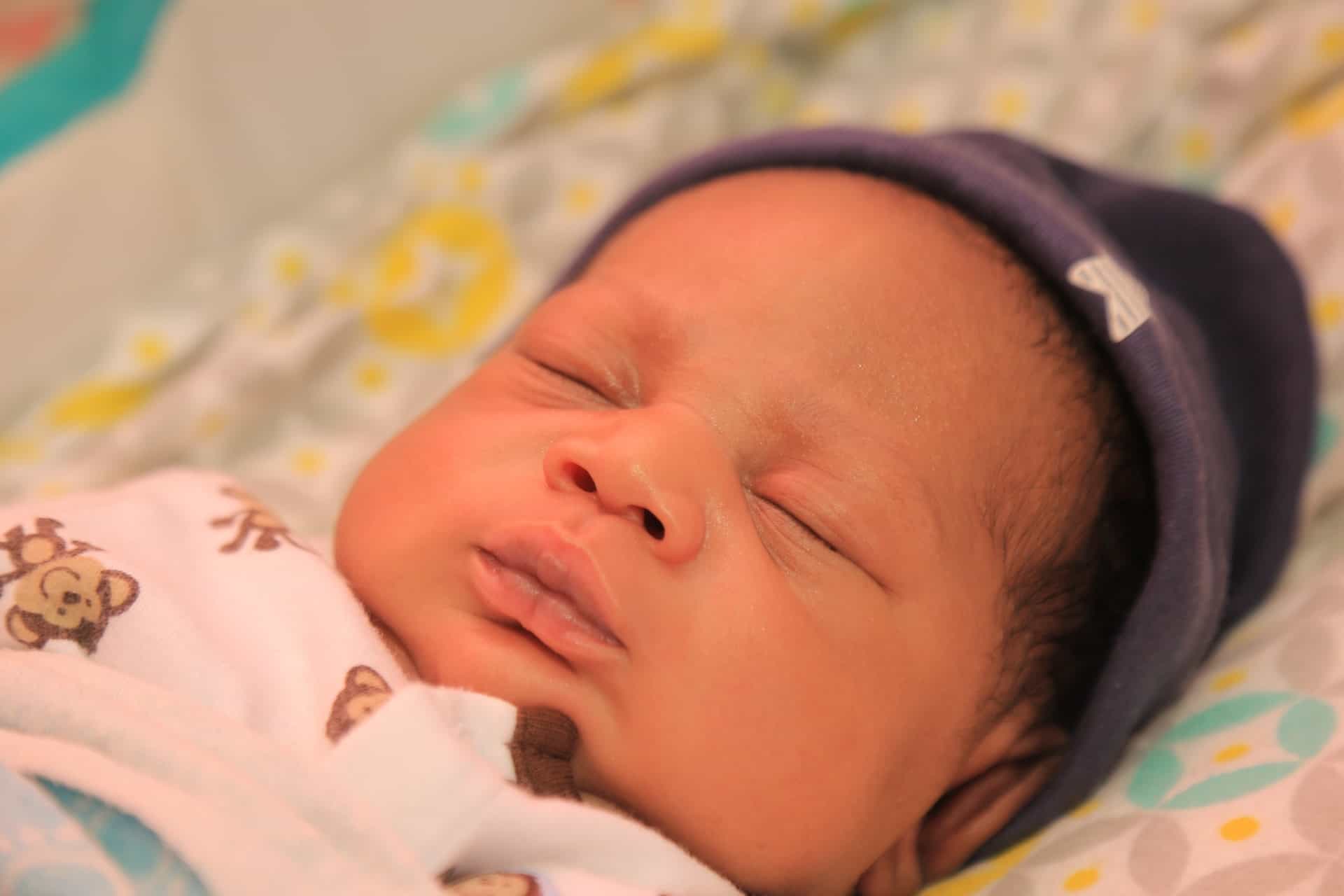Are you an expecting parent or recently welcomed a baby? If so, this article on newborn sleep schedule ideas is one you will want to save for reference and read in detail. My name is Kayla; I am a mama of two littles, a Registered Nurse, and a Certified Pediatric Sleep Consultant. I work with families to help improve sleep for their babies and toddlers, working with infants up until four years of age.
My specialty is working with parents of newborns to help implement healthy sleep habits from the start! Every parent can positively impact their babies’ sleep by starting to lay the foundation in the newborn stage. It is never too early to focus on healthy sleep practices. The sooner you understand newborn sleep needs, the more confidence you will feel during this period.
I will review wake windows, sleep cues, sample schedules, and how to best support your newborn sleep needs. Let us dive in!
Bottom Line: Newborns should sleep an average of 15-18 hours in 24 hours. We are looking at broken sleep segments because of their need to eat frequently. Sleep occurs over 6-8 naps per day, and the remaining is overnight. Wake window lengths are on the shorter end.
Newborns only tolerate small periods of staying awake before they require sleep. On average, your newborn will be falling asleep between 30-60 minutes from when they woke up, the average length is 45-60 minutes.
Introduction to Newborn Sleep
As new parents or parents back in the newborn stage, one hot topic that seems to be on everyone’s mind is newborn sleep. Maybe you are already searching “how to get my newborn to sleep”. First, let us discuss what our newborns need developmentally for sleep.
Our newborns are developing at rapid speeds. In the first two weeks of life, our primary focus is establishing feeding (whether breastfeeding or bottle feeding). The goal is to hit their birth weight and exceed it by two weeks of age. You may find your newborn is very sleepy those first two weeks of life.
This is because the labor and delivery process is hard on a baby, just as it is on a mama. Let your baby sleep. I know you want to see them open their eyes, examine their faces, and start engaging but this two-week period is a phase of rest.
You will want to wake your baby during the day to keep their daytime feeds on track. A well-fed newborn will sleep better at night for what is developmentally achievable.
Ideally, we want to make sure our newborns sleep a total of 15-20 hours on average within 24 hours. Due to the frequency of feeds, we often do not see long stretches of sleep but we see multiple naps per day which vary in length. Naps can range from 6-8 per day for a total of 6-8 hours on average. The remaining bouts occur at night, usually 8-9 hours of sleep through broken segments to allow for night feeds.
Wake Windows
A newborn has a low tolerance for staying awake for extended periods. As mentioned above the first two weeks, a baby will likely be very sleepy. The time your baby can stay awake may only reach 30-45 minutes during those first few weeks of life. Instead of trying to keep your newborn awake for a full hour, let them rest after their feed. It is normal for some newborns to wake up, feed, have their diaper changed, and be ready to fall asleep moments later.
On average, we see wake windows of 45-60 minutes in length. This starts from when your baby wakes up until the time they are ready to fall asleep again. However, in the first 2-4 weeks of life, the first few wake windows of the day may not reach the 60-minute mark. If your newborn shows sleep cues on the lower end of wake windows, trust that your baby is ready to fall asleep.
With every passing week or two, you will notice your newborn is becoming more alert and able to tolerate longer wake windows. If your newborn tolerates wake time of 30-45 minutes the first few weeks of life, you will notice they now require an extra 5-10 minutes of staying awake.
It is always best to slowly stretch wake windows during the newborn stage vs. skyrocketing their wake window an extra 15-30 minutes. Overextending wake windows may leave us with an over-tried newborn. This can be very difficult to deal with, cue screaming baby.
Feeds
I would not be able to discuss newborn sleep schedule ideas without mentioning one of the most important newborn topics, feeds. Due to how tiny a newborn’s stomach is, we see frequent feedings; required for proper growth and development. For breastfeeding families, we want to see feeds occurring every 2-3 hours during the day. Formula feeding or combo feeding, the frequency is often every 2.5-3.5 hours.
Our newborn babies should not go for 4 hours feed to feed during the day. If you and your baby accidentally sleep longer during the day, it will impact the frequency of nighttime wakings. Due to the fact, newborns need to eat so many calories in 24 hours. If their daytime feeds are spread out, newborns will wake more frequently at night to make up for their calorie needs.
Ideally, we want to see 8-10 feeds for our newborns within 24 hours. Think of your baby’s day for feeds and sleep as a 24-hour clock, we need to fit in what we can during the daytime. Remember this is from when they wake up to start their day until their bedtime which naturally is later in the newborn stage.
Expert Sleep Tip: During the day set a timer at the 3-hour mark from the previous feed. If your baby has a solid two-hour nap, you will know to wake up your baby when the alarm goes off. This will help keep feeds on track which will set your baby up for the best success for nighttime sleep.
Bedtime
We often envision putting our babies down for sleep before 8:00 pm, taking a shower, and enjoying the remainder of the evening with our partner. That can be a reality for many of us once we are out of the newborn stage. Newborns do not have a developed day-night circadian rhythm which means they have a much later bedtime.
An actual set bedtime in those first 2-4 weeks of life likely will not occur because you are in survival mode. Remember, the primary focus is establishing feeding. We often see periods of cluster feeding that can throw off any idea of accomplishing a bedtime routine.
Once your newborn has exceeded its birth weight and you are a few weeks into this new stage of life, you can start focusing on a very loose bedtime.
Bedtime in the newborn stage will resemble putting your baby to sleep between 9:00-11:00 pm. That is a range and will depend on when your baby woke up from their last nap of the day. Usually, the last nap starts anytime after 7:00-8:00 pm. Once your baby is awake they will have their longest period of wake time leading up to bedtime. It is normal for that last nap to vary greatly in duration which is why we would see inconsistent bedtimes in the newborn stage.
With every passing week, bedtime can slowly shift slightly earlier. By the 3-month mark, it will be a good time to focus on bedtime occurring before 9:00 pm, often around 8:00 pm. Some babies can now tolerate going to bed between 7:00-8:00 pm.
If you’re wondering how long your newborn can sleep at night, expect your baby to wake to feed every 3-4 hours. Once your baby has achieved and exceeded its birth weight, you can discuss with your healthcare provider a safe length your baby can sleep in one stretch at night.
For example, once my daughter hit her birth weight our healthcare provider confirmed we could let her sleep at night without waking her to eat. We started to see her 3.5-4 hour stretch of sleep lengthen to 5 hours. In the newborn stage, a 5 hour stretch of sleep can feel glorious. Every passing week with sleep shaping strategies this would lengthen ever so slightly.
A rule of thumb as a reference, once your baby has exceeded their birth weight, they can sleep 1 hour per week of age. Therefore a 5-week-old baby can sleep 5 hours. This is a guideline, yet should be mindful that babies can wake up at night and need help re-settling.
Expert Sleep Tip: Using white noise before bedtime is a great signal that sleep is approaching. It can be impossible to have an elaborate bedtime routine when a newborn’s wake windows are short. You can start to implement simple steps. You can focus on the last feed of the day, swaddle your newborn, put the white noise on, and then lay the baby down for bedtime. After repeating these steps for weeks, this can start to form the basis of the bedtime routine. Allowing every step to signal to the baby’s sleep is approaching.
Morning Wake Up
Likely your baby’s day will start between 7:00-8:00 am initially. If you had a difficult night it can be tempting to want to sleep in until 9:00 or even 10:00 am, especially if the baby is still sound asleep. However, doing this consistently over time will negatively impact your day as it shifts bedtime too much later. One of the ways to structure your day is by focusing on a regular morning wake-up time.
Daytime Naps
We know we will see multiple naps a day during the newborn stage but you may be wondering about the length of each nap. Newborn sleep is often sporadic because the circadian rhythm has yet to develop, having a true structured daytime schedule is next to impossible. Regardless, you can create a flow to your day and this can be structured based on age-appropriate wake windows, sleep cues, and capping naps.
As mentioned, we have to feed very regularly during the day. This is why capping naps at the 2-hour or maximum 2.5-hour mark will help keep your daytime feeds on track, providing some form of flow to your day.
It is developmentally normal for a newborn to sleep a solid 2 hours during the day, it is also just as normal for your baby to wake up after only napping for 30-45 minutes.
If your newborn seems over-tired this is when focusing on holding your baby in a decreased stimuli environment can help soothe and calm your baby. It is more important that your newborn receives proper daytime sleep vs. where they sleep. Meaning if you are trying to have your newborn nap in their bassinet, crib, or cot without success, instead of continuing to try and end up with an over-tired baby, focus on the baby having a solid nap in your arms.
Sleep Cues
In addition to following age-appropriate wake windows, sleep cues can be an even better rule to follow for your newborn. I find the first two months of life level 1 sleep cues are the most imperative marker to follow. Level 1 sleep cues let you know when baby is ready for sleep vs standard wake window lengths.
In my opinion, this is because newborns are vastly different and a 30-60 minute wake window length varies too much from one baby to the next. You can count on every newborn showing us when they are tired and need to be put down for sleep.
I classify sleep cues in three different levels; level 1 would be the ideal time to prep your newborn for sleep. Level 2 you are slowly missing the ideal opportunity to allow your baby to fall asleep. Once your baby has hit level 3 sleep cues they are past due for sleep and over-tired, making it hard for your newborn to fall asleep successfully.
Level 1 – Ideal Time To Put Newborn To Sleep
- Zoning Out
- Glossy Eyes
- Avoiding Eye Contact
- Pink/Red Eyebrows
These cues can be very subtle and easily missed, especially if you have an older child at home needing your attention. These cues start at the time your newborn is feeling sleepy and ready to fall asleep. If we miss this opportunity it can be harder for a baby to fall asleep once they reach level 2 or level 3.
After 30 minutes of your newborn being awake, start looking for any of these sleep cues. Your newborn does not need to have every sign to be ready to fall asleep. One sleep cue is enough to tell you your newborn is ready to fall asleep in a few moments.
Level 2 – Tired Newborn Who May Need Help Falling Asleep
- Yawning
- Fussiness
- Pulling Ears
- Becoming Restless
Turn on the white noise and try getting your baby to sleep whether in their sleep space or on you.
Level 3 – Over-Tired Newborn Who Needs Lots Of Help Falling Asleep
- Arching/Pulling Away
- Hysterical
- Rigid Body
This stage means we have missed the ideal opportunity to place your newborn down for sleep and you may need to pull out all the tricks to get your baby to fall asleep.
Expert Sleep Tip: this can be an ideal time to try skin-to-skin and use motion to calm your baby.
Newborn Sleep Tips (0-2 Months Of Age):
- Engage Calming Strategies: swaddle, and motion to help ease into sleep.
- WOMB Like Environment: white noise, optimal temperature, mama/dada scent, blackout.
Creating a womb-like environment through the use of white noise will mimic the sounds in utero, it will help create a similar space your newborn was used to while developing in the womb. Blacking out the room your newborn sleeps in can help with nighttime sleep.
Newborns have a hard time regulating their temperature so you want the room they sleep in to be the proper temperature (68-72 degrees). The more their sleep space smells like you the better. Wrap the bassinet, cot, or crib sheet when the baby is having a feed or during a cuddle session.
Newborn Sleep Schedule Ideas
7:00 am -Up/Feed 1 /Burp/Diaper Change
7:45-9:30 am – Nap 1 (1.75 hours)
9:30 am – Feed 2/Burp/Diaper Change
10:15-12:15 pm – Nap 2 (2 hours)
12:15 pm – Feed 3/Burp/Diaper Change
1:15-2:15 pm – Nap 3 (1 hour)
2:15 -Feed 4/Burp/Diaper Change
3:15-4:30 pm – Nap 4 (1.25 hours)
4:30 pm – Feed 5/Burp/Diaper Change
5:30-6:15 pm – Nap 5 (45 minutes)
6:30 pm – Feed 6/Burp/Diaper Change
7:30-8:30 pm – Nap 6 (1 hour)
8:30 pm – Feed 7/Burp/Diaper Change
9:15 pm – Top Up/Cluster Feed/Swaddle
9:30 – Bedtime
The above example provides 7hours+45minutes of daytime sleep with the remaining rest period occurring at night. Likely we would see two feeds in the middle of the night before waking up the following day. Newborn sleep as mentioned previously can be very sporadic. Instead of trying to fit into a set schedule or perfect mold, your newborn likely will have shorter nap lengths compared to what is listed above. If your baby does wake up after only napping for 30-45 minutes and it’s earlier in the day, try holding your newborn to extend the nap to be a little longer.
Some newborns feed more frequently than the listed lengths. Always feed your baby at the signs of hunger cues and then after some time awake, try for another nap.
If your newborn seems to be a micro napper, only napping for 20-30 minutes at a time make sure they are not in a chronically over-tired phase. Sometimes our newborns need a solid nap in our arms to help get them back on track.
I find the first nap of the day is usually the easiest to achieve, this is the one if you nail the proper wake window by focusing on level 1 sleep cues, you can potentially have your newborn falling asleep in their sleep space.
Due to the Moro or startle reflex, newborns can easily wake themselves up. This is why using a swaddle can help immensely in the first two months of life.
Not every newborn will love a traditional swaddle. Thankfully there are many products on the market and it’s all about finding the swaddle that suits your newborn. For example, my son enjoyed a traditional swaddle after a few attempts but my daughter did best with her arms up, thankfully they make swaddles that allow arms up and to move freely.
Newborns can experience day and night confusion. That is when a baby can sleep soundly during the day but be wide awake in the middle of the night. One practice to implement would be to have the newborn exposed to light during wake time. Sit in a common room or area such as the living room.
Have the blinds up, allow the sunshine to filter into your home, and focus on all daytime feeds occurring in a bright and cheerful area. I started my baby’s day by drawing the blinds, letting natural light fill the bedtime, and shutting off the white noise.
Upon waking them up, we would venture to the living room with the blinds opened and music on. We started our mornings with a feed, burp, and diaper change, and shortly after it was time for their first nap.
Creating structure to your day, even if that focuses on the process of waking, can anchor your day and provides the consistency that most of us crave.
FAQs – Newborn Sleep Schedule Ideas
Question: What is a good schedule for a newborn?
Answer: Focus on your newborn sleeping for 15-20 hours in 24 hours (average is 14-18 hours). Allowing 6-8 naps during the day with the remainder at night. You will see bedtime occurring after 9:00 pm in the newborn stage. Feedings occur every 2-3 hours during the day, or 2.5-3.5 hours for those babies who can go slightly longer from one feed to the next.
Question: When can you start a routine for your newborn?
Answer: You can start as early as the first few weeks. This would be focusing on starting the day with the same wake-up time which can create flow after a few weeks of consistency. Focusing on consistent daytime feeds will also provide some form of routine and after a few weeks of maintaining this structure, you should see nights slowly improve with how long your newborn can sleep.
Question: How long should newborns sleep and be awake?
Answer: Newborns have short wake windows and often need sleep after only being awake for 30-60 minutes, with an average wake window length of 45 minutes. Your newborn may sleep upwards of 2-2.5 hours during the day, it is recommended if your newborn is still sleeping at the 2-2.5 hour mark to wake them up and provide them with a feed. This will help them sleep better at night as they need 8-10 feeds in 24 hours, the bulk of those feeds ideally should occur during the day.
Final Thoughts
The newborn stage can come with many challenges but also many tender and beautiful moments. We can be very eager to start creating a routine and consistency in our day. It is never too early to start but be mindful that it takes time for a routine to click. With practice and creating flow to your newborn’s day through sleep cues and consistent feeds, over the first 4-8 weeks of life a routine develops.
The most important factors are maintaining consistent daytime feeds and allowing your newborn the opportunity to sleep when they are experiencing level 1 sleep cues.
When you honor these two factors, the rest of the day can fall into place over time. They say sleep when the baby sleeps; one of the most challenging tasks is when you also need to feed yourself and take a shower. If possible, discuss taking shifts with your partner regarding nighttime sleep. Newborns do not necessarily need to eat every single time they wake up at night. Sometimes they need extra comfort and help falling back asleep.
The more support you can lean on, the easier you can handle the challenges of the newborn stage. Remember, this too shall pass. Eventually, you will be out of the newborn stage and into infancy. Wake windows will lengthen, and you may start to feel you are getting into a groove. If you need newborn sleep help, I specialize in this department. You can find all you need to know through a virtual session called Sleep Shaping. Visit www.serenitysleepsuccess.com to access a virtual newborn session.
Read also:
- 2 Month Old Sleep Schedule Ideas
- 5 Month Old Sleep Schedule Ideas
- 7 Month Old Sleep Schedule Ideas
- 10 Month Old Sleep Schedule Ideas
Kayla is a mama of two littles, each born during the Covid-19 pandemic. Prior to becoming a mom, she worked as a Registered Nurse for 12 years. Now as a Certified Pediatric Sleep Consultant, she owns and runs Serenity Sleep Consulting full time.
After having her first baby, sleep deprivation hit hard. She was desperate for rest and knew she needed to focus on establishing a healthy sleep foundation. Kayla researched infant sleep and started to focus on what she likes to call Sleep Shaping. Her son went from waking every hour to sleeping 4-5 hour stretch, followed by 6-8 hours, and eventually 12 hours at 3 months of age. This method has turned into her signature service, it allows her to provide education and tools to help families with newborns. She also works with those who have babies 4 months upwards of 4-5 years.
We all function at our optimal level with a full night’s rest and Kayla loves to support parents in this journey!






